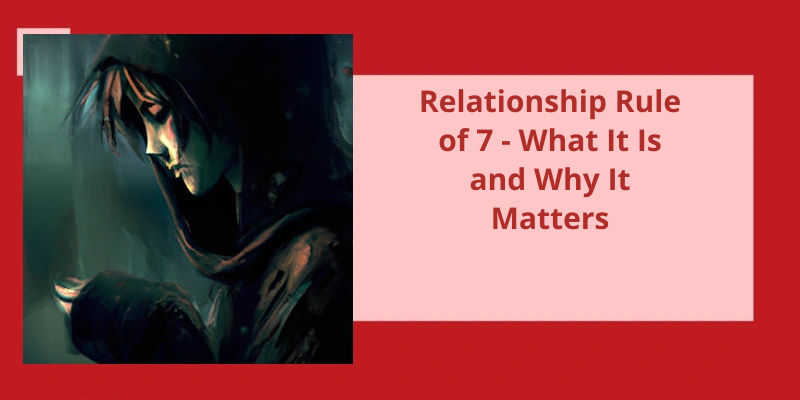There’s a long-standing tradition in many cultures that there should be a specific age difference between partners in order for their relationship to be considered acceptable. This rule has gained traction in recent years as a way to determine whether a relationship may be problematic or considered socially inappropriate. For instance, a 26-year-old person should date someone who’s at least 20 years old, according to this rule. Despite it’s effectiveness in identifying problematic relationships, the rule has faced criticism for it’s reliance on arbitrary patterns rather than personal, mutual compatibility.
What Is a 7 in Dating?
In the world of dating, age and social norms can often collide in unexpected ways. One such example is the “rule of 7,” which suggests that for a relationship to be socially acceptable, the younger partner in the relationship should be older than half the older partners age plus seven years. In other words, if someone is 40 years old, their partner should ideally be at least 27 years old or older.
However, it’s important to keep in mind that the rule of 7 isn’t universally accepted, and many people reject it outright. Some argue that age differences in dating should be left up to individual choice and preference, rather than adhering to arbitrary rules. Others argue that the rule of 7 can be overly simplistic and doesn’t take into account other factors, such as emotional maturity or life experience.
While some people may find it helpful or comforting to adhere to this rule, others may reject it or even find it offensive. As with any aspect of dating and relationships, it’s important to be aware of social norms and expectations but ultimately make choices that feel authentic and fulfilling for oneself.
Whether or not you choose to adhere to the rule of 7 in your own dating life, it’s important to approach relationships with an open mind and an awareness of your own needs and boundaries. By communicating clearly with your partner and being honest about your desires and expectations, you can create a healthy and fulfilling relationship regardless of age differences or other external factors. Ultimately, what matters most is finding a partner who respects and supports you, regardless of their age or any other arbitrary factor.
Pros and Cons of Dating Someone Older or Younger
- Pros and cons of dating someone older or younger
- Experience and maturity of the older partner
- Different stages of life may lead to different goals and priorities
- Potential for a power imbalance in the relationship
- Older partners may have already gone through certain life experiences and be less interested in trying new things
- Younger partners may be more energetic and open-minded about life
- The societal stigma surrounding age differences in relationships
- Potential for generational differences in values and beliefs
- Age gaps could affect family dynamics and expectations
- The importance of communication and mutual respect in any relationship
The “7 age gap relationship” rule is a popular guideline used by some individuals when considering the appropriate age range for a romantic partner. This rule suggests that the younger person in a relationship shouldn’t be less than half the age of the older person plus seven years. While this rule isn’t a hard and fast rule, some people use it as a way to gauge if a significant age difference could potentially create challenges in a relationship.
What Is a 7 Age Gap Relationship?
A 7-year age gap relationship is one where the age difference between two partners is seven years or more. This means one person is at least seven years older or younger than the other. According to this rule, the younger partners age should be at least half the older partners age plus seven years.
Age is often seen as a defining factor in relationships, and the stigma surrounding large age gaps can be significant.
It may be challenging for some couples to bridge the age gap, as they come from different generations and may have different interests and life experiences. However, these differences can also be a source of excitement and learning, helping the partners to broaden their perspectives and deepen their connection.
While age is just a number, it can have significant implications when it comes to matters such as family planning and life goals.
Age shouldn’t be the defining factor in a relationship, but rather a complementary element that adds to the richness and depth of the bond.
Benefits and Challenges of a 7+ Year Age Gap Relationship
“Research shows that couples with a 7+ year age gap relationship may have some benefits such as increased emotional maturity, better communication skills, and different perspectives. However, there may also be challenges such as generational differences, differing life goals, or societal judgment. It ultimately depends on the individuals involved and their compatibility.”
Conclusion
In conclusion, the relationship rule of 7 has been a controversial topic for many years. Some people believe that age is just a number and shouldn’t be a factor in love, while others argue that there should be a limit to the age difference between couples. While this rule may not apply to everyone and every situation, it can be a helpful guideline for individuals who’re considering dating someone significantly older or younger than themselves. Ultimately, the success of any relationship relies on mutual respect, communication, and compatibility, rather than simply conforming to societal norms.






